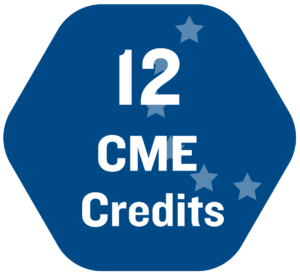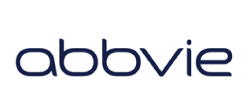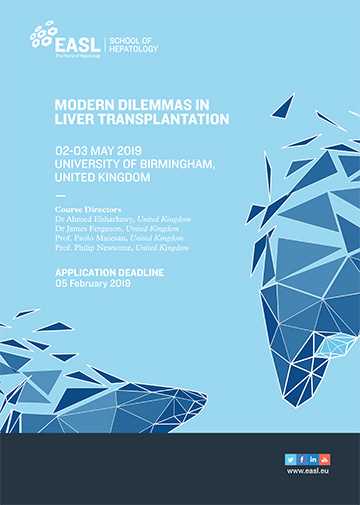Course directors
- Dr Ahmed Elsharkawy, United Kingdom
- Dr James Ferguson, United Kingdom
- Prof. Paolo Muiesan, United Kingdom
- Prof. Philip Newsome, United Kingdom
Description
Through a series of six cases, the school will highlight and discuss in detail some of the complicated nuances in the management of the modern liver transplant recipient throughout their journey from assessment, to the transplant procedure itself and then the immediate and long term management of the patients. Particular emphasis will be given to areas of uncertainty and the expert multidisciplinary faculty will be on hand to provide their personal experiences and opinions on these cases.
The school will adopt the flipped classroom model. This is effectively learner centered and problem orientated. Attendees will be provided with materials 4 weeks prior to the school and will be expected to work in small groups to answer questions on the individual cases which will then be presented to the wider group on the second day of the school.
Who should attend?
- Hepatologists in training especially those considering a career in adult liver transplantation
- Transplant surgeons in training
- Intensive care trainees with an interest in management of liver transplant patients
- This course may also be of interest to liver transplant coordinators or other multidisciplinary professionals working in the liver transplant field.
Learning Objectives
- To gain knowledge of the transplant assessment process and understand how cumulative risks are assessed prior to listing patients for liver transplant
- To understand the criteria for transplantation in HCC and how different modalities can be used to bridge and/or downstage patients
- To gain an understanding of the increasing availability and utilization of machine perfusion in liver transplantation and how this impacts on both donor and recipient choice
- To start to appreciate the complexities of management of the transplant recipient on the intensive care unit in the immediate aftermath of the operation
- To gain a good working knowledge of the different immunosuppressive regimens used post transplant and the impact of rejection and recurrent disease on the recipient
- To understand the incidence and impact of hepatic artery thrombosis on transplant recipients and how this condition should be managed
- To start to appreciate the unique challenges involved in management of adolescent and young adult recipients of liver transplants
About EASL Schools
The schools contribute to the training of new generations of hepatologists and are a major element of our association. Aimed at young fellows enrolled in hepatology-oriented departments or more experienced clinicians who want to be exposed to the newest trends in hepatology.
For selected applicants, EASL will cover transportation costs to attend the school and accommodation during the event (details will be provided individually once the selection process has been done).
Application is open to young fellows under the age of 35 (born after 17 September 1987) and/or still in training.
Approximately 30 places are available for each school and only EASL members are allowed to apply. Become an EASL member
CME Accreditation


Through an agreement between the Union Européenne des Médecins Spécialistes and the American Medical Association, physicians may convert EACCME® credits to an equivalent number of AMA PRA Category 1 Credits™. Information on the process to convert EACCME® credit to AMA credit can be found at www.ama-assn.org/education/earn-credit-participation-international-activities.
Live educational activities, occurring outside of Canada, recognised by the UEMS-EACCME® for ECMEC®s are deemed to be Accredited Group Learning Activities (Section 1) as defined by the Maintenance of Certification Program of the Royal College of Physicians and Surgeons of Canada.
EACCME® credits
Each participant can only receive the number of credits he/she is entitled to according to his/her actual participation at the event once he/she has completed the feedback form. Cf. criteria 9 and 23 of UEMS 2016.20.
In order to help you issue individual certificates to each participants, please find below the breakdown of ECMEC®s per day:
02 May 2019 – 7,00
03 May 2019 – 5,00
The EACCME® awards ECMEC®s on the basis of 1 ECMEC® for one hour of CME with a maximum of 8 ECMEC®s per day. Cf. Chapter X of UEMS 2016.20.
For any question, please contact: schools@easloffice.eu
Acknowledgements


The event is supported by an unrestricted education grant from Abbvie. Abbvie has had no input into the contents of the programme and website.



